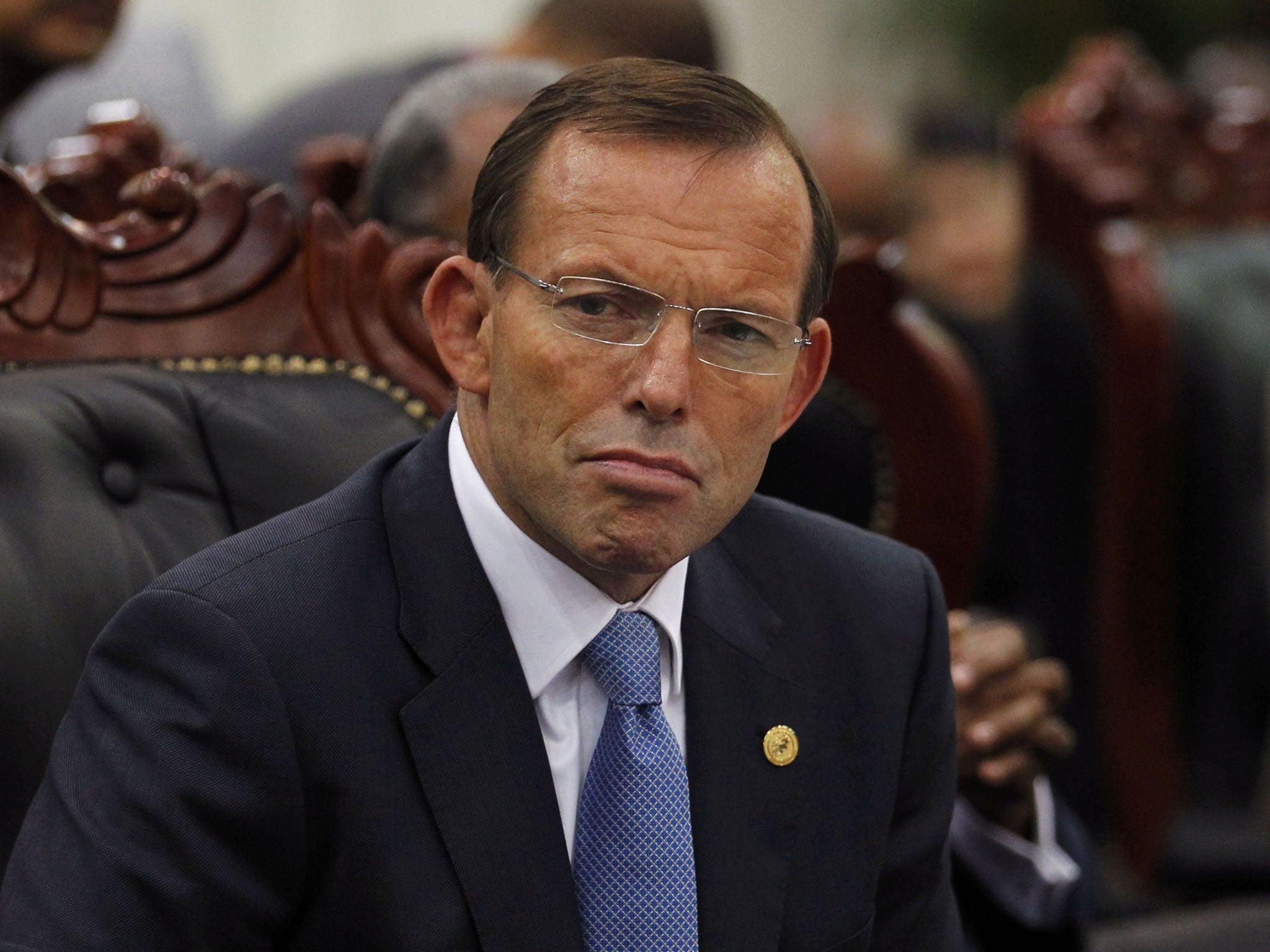'All governments gather information': Australian Prime Minister Tony Abbott admits to 'gathering information'

“All governments gather information … and all governments know that every other government gathers information,” Tony Abbott declared in parliament on Monday, effectively confirming reports that Australia had tried to eavesdrop on mobile phone conversations between the Indonesian President, Susilo Bambang Yudhoyono, and close confidants including his wife.
Such remarks were unlikely to appease Mr Yudhoyono, who was said to be “devastated” by the revelations. By Monday night, Indonesia had recalled its ambassador to Canberra, summoned the Australian ambassador for a stiff talking-to and announced a review of bilateral cooperation.
Mr Abbott was not even opposition leader in 2009, when, according to documents leaked by the US whistleblower Edward Snowden, Australia mounted the intelligence-gathering operation. But his handling of the diplomatic spat has reinforced perceptions of him as a foreign policy lightweight producing gaffe after gaffe on the world stage.
Relations with Australia’s nearest Asian neighbour and key regional ally were already strained, less than three months into Mr Abbott’s prime ministership, thanks to his election pledge – made without consulting Jakarta – that asylum-seeker boats heading to Australia would be intercepted and sent back to Indonesia, where they had begun their voyage.
In recent days, his praise for the Sri Lankan government’s human rights record has horrified many Australians, who contrasted it with David Cameron’s far more robust stance. “We accept that sometimes, in difficult circumstances, difficult things happen,” Mr Abbott pronounced at the Commonwealth Heads of Government Meeting in Colombo, referring to allegations of war crimes by the Sri Lankan military.
Mr Abbott – who once described human-induced climate change as “absolute crap” – has also been widely condemned for failing to send a Cabinet representative to the United Nations climate change conference in Warsaw. The Environment Minister, Greg Hunt, was too busy dealing with legislation to repeal the previous government’s “carbon tax”, he explained. As one commentator wrote: “You seriously can’t make this stuff up.”
As opposition leader, Mr Abbott never showed much interest in foreign affairs. In a book called Battlelines, which contained a personal manifesto, he devoted little space to the subject, beyond extolling the virtues of the “Anglosphere”.
Many wondered about his grasp of complex issues when, during the debate about possible US air strikes against the Syrian regime, he described the civil war there as “baddies versus baddies”.
In office, one of his first acts was to slash A$4.5bn (£2.6bn) from the foreign aid budget and abolish the government’s international development agency – sending “a blunt signal … that Australia is a spoilt and selfish country that’s indifferent to the moral obligations of the richest nations to the poorest”, as Mark Baker, editor-at-large of Melbourne’s The Age newspaper, wrote.
In fairness, Mr Abbott’s predecessors were hardly faultless. Despite Kevin Rudd being a fluent Mandarin speaker and former diplomat, Australia’s relations with China worsened during his prime ministership. Julia Gillard frankly admitted to lacking “a passion for foreign affairs”.
However, as Raoul Heinrichs, a former Rudd adviser, wrote in The Age recently: “Even allowing for inexperience, the Abbott government appears to be setting a new standard for diplomatic ineptitude. The Prime Minister in particular has lurched from one mistake to another, with each episode more ham-fisted than the last.”
The swift, steep deterioration in relations with Indonesia is ironic, given that Mr Abbott had promised a foreign policy that would be “more Jakarta, less Geneva” in focus.
Over the past fortnight, Indonesia has made clear that it will not stomach asylum-seeker boats being sent back to its shores, just to keep Australian redneck voters happy. Australia was forced to transport 63 people to Christmas Island, its Indian Ocean territory, after Jakarta refused – during a 24-hour stand-off on the high seas – to take them back.
It was the second time it had adopted that stance – or perhaps the third, if the Jakarta Post is to be believed. With Mr Abbott shrouding events at sea in a blanket of secrecy, opposition MPs complain that that newspaper is a better source of information than the Australian government.
Monday’s diplomatic rupture follows earlier reports that Australia’s embassy in Jakarta is being used to house electronic surveillance equipment employed to spy on Indonesia and other countries in the region.
The latest Snowden documents, which are from Australia’s Defence Signals Directorate, contain a wishlist of surveillance targets. Along with Mr Yudhoyono and his wife, Kristiani Herawati, the list includes the Vice-President, Boediono, who like many Indonesians goes by one name, and Mr Yudhoyono’s foreign affairs spokesman, Dino Patti Djalal.
Indonesia’s urbane, British-educated Foreign Minister, Marty Natalegawa, was not mincing words on Monday. “This is an unfriendly, unbecoming act between strategic partners,” he told reporters. And, responding to Mr Abbott’s observation that all governments spy on each other, Mr Natalegawa retorted: “I’ve got news for you: we don’t do it.”
Subscribe to Independent Premium to bookmark this article
Want to bookmark your favourite articles and stories to read or reference later? Start your Independent Premium subscription today.

Join our commenting forum
Join thought-provoking conversations, follow other Independent readers and see their replies